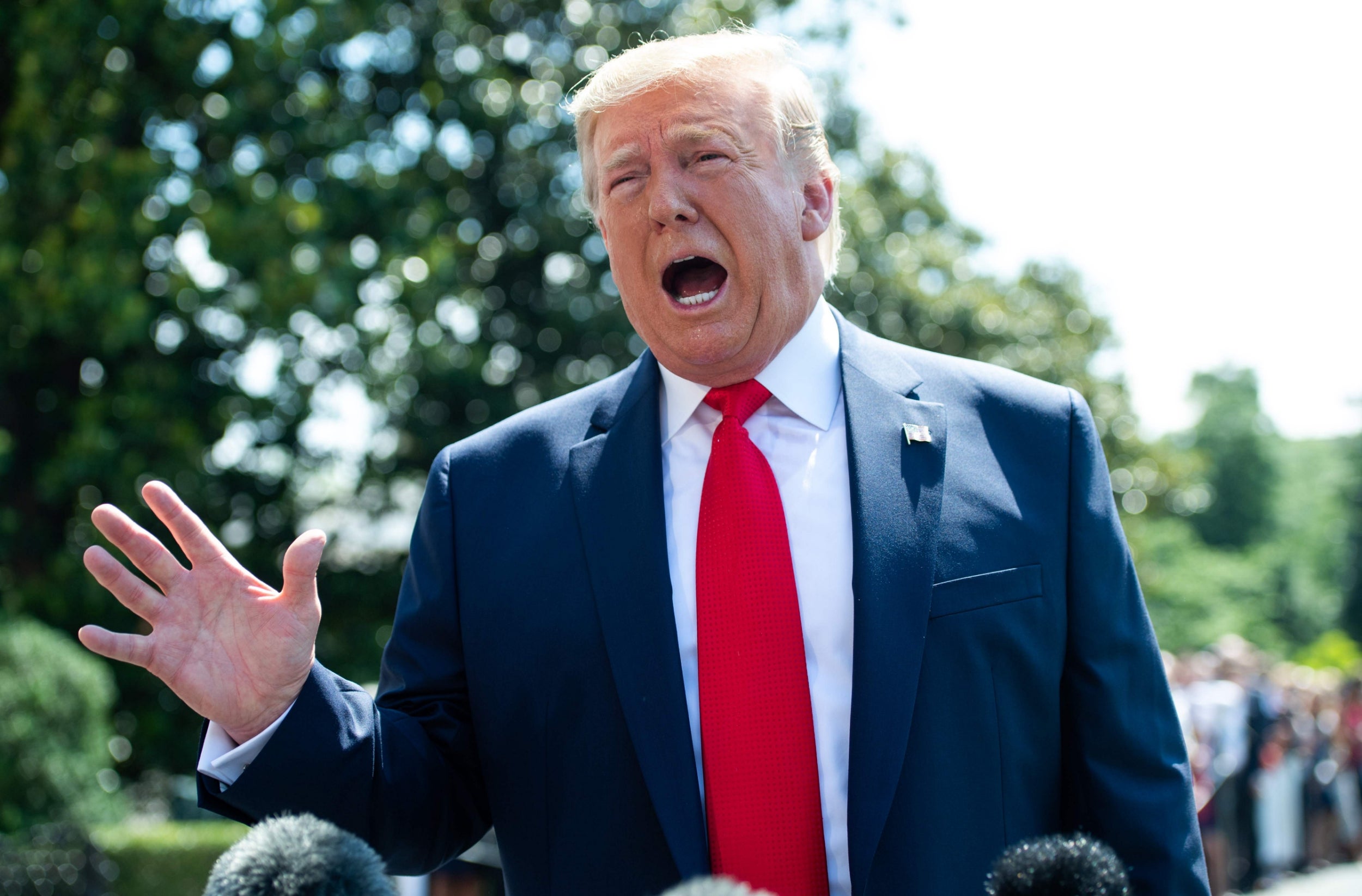Trump is angry about my hometown banning the Pledge of Allegiance. Here's the real story behind the outraged tweets
Progressives say patriotism is a sham if compulsory, while others insist that pledging respects wartime sacrifice and American freedoms. Some of us won’t say the pledge until people at the southern US border are no longer separated from their kids

Apparently, Donald Trump multitasks his outrage. Still ranting at the UK government over leaks from the Trump-critical correspondence of newly resigned UK ambassador Kim Darroch to a British tabloid, he pivoted from this major diplomatic incident to busy his tiny tweeting fingers with the civic matters of my hometown yesterday. His issue? The council of St Louis Park, a leafy inner-ring Minneapolis suburb, announced recently that it would cease a 30-year tradition of pre-gavel recitations of the Pledge of Allegiance.
Shortly after the President’s intervention, a flying picket of concerned citizens from other suburbs and angry out-of-towners descended on City Hall in MAGA hats and flag-laden apparel, loudly chanting allegiance on boulevards and sidewalks I recognised immediately.
Those of us who grew up or live in St Louis Park, a small city of 45,000 middle-class Midwesterners, are unaccustomed to the sort of attention it's attracted since the Tweeter-in-Chief decided to take issue with it. Everybody calls it Park, unless we’re middle-name furious with it. My ex-classmates and former neighbours should be enjoying a Minnesota summer of water sports, trips to “the cabin”, fishing, and dodging the billions of mosquitoes that show up the minute school’s finally out. Yet since 17 June, when councillors voted to drop the Pledge of Allegiance, right-wing commentators and cable news networks put my hometown in their sights, while a back-and-forth on Park-centric Facebook groups rumbles along between old friends and neighbours now flung around the world — or down the street.
Mostly, we’re civil. Never mind that most of us – me included – didn’t know the Pledge was recited until the vote. Some of us want to rail against the decision; others respond with historical facts, embracing a teachable moment. Minneapolis and Park’s conservatively posh rival, Edina, never used it at City Hall. One person has noted that the original author, the Christian socialist Francis Bellamy, never wrote “under God” in his version – that was added on Flag Day in 1954, just 12 years after the Pledge was officially adopted, to distinguish Americans from godless communists during the McCarthy era.
In high school, I was one of those kids sitting near the front of class trading topical barbs with my teachers, so I earned a reputation as a sarcastic Anglophile nerd, a left-handed left-winger. I’ve never been a fan of the 1954 iteration of the Pledge of Allegiance, because adding God to a civic pledge violates First Amendment rights; taking an official oath consecrated in wartime — 1942 — also feels wrong. Park adopted the custom during Ronald Reagan's tenure, and because history repeats as farce — especially with presidential hairstyles — I'd doubtless have objected if I'd known at the time. As a result, I want to keep the Pledge optional, or align with nearby cities and towns that didn't move to a former president's Hollywood patriotism.
Progressives, liberals and libertarians wrote in that Park Facebook group this week patriotism is a sham if compulsory, while others insisted a pledge respects wartime sacrifice and American freedoms. Some of us won’t say it again until migrants at the southern US border are no longer separated from their kids or indefinitely detained. An ex-classmate is embarrassed by the kerfuffle – a typical Minnesotan response to mortifying attention. Her comment was heavy with Likes.
St Louis Park is best known as the hometown of filmmakers Joel and Ethan Coen; former senator Al Franken grew up here, as did Dr Fink and Bobby Z of Prince’s Revolution, feminist author Peggy Orenstein, and the Washington Post’s Thomas L Friedman, who published his first piece of journalism in our high school paper. In the 1950s, Park welcomed Jewish people seeking suburban bliss — other inner-ring suburbs like Edina redlined Jews, relying on developer covenants to exclude them. Immigrants and their children continue to settle in Park; the city still attracts Jewish residents with its eruv, and there’s now a Spanish immersion school. Not uniquely, my mother’s family lived here for three generations. I grew up down the street from where she was raised. At school, the sons and daughters of her classmates sat next to me, and her capable old teachers led our classes. It’s the kind of place that aspires to be above average in its attitudes.

Since losing the state to Hillary Clinton in 2016, Donald Trump is fixated on taking Minnesota from the DFL in 2020 (here, the Democratic Party is known as Democratic Farmer-Labor; the GOP, Independent-Republican). Minneapolis and its inner suburbs make up MN5, the US Congressional District of Ilhan Omar, elected to Congress with 78.1 per cent of a high-turnout vote. Trump certainly doesn’t seem that keen on progressive women of colour who answer back.
St Louis Park registers voter participation over 90 per cent at state and federal elections. Local people discussing the implications of whether to pledge attended a well-regarded high school with excellent Civics classes and an internationally acclaimed World Religions elective. We always try hard to get along. Regardless of individual politics, democracy is important to us and we are bonded by affection for Park.
Meanwhile, because St Louis Park’s mayor Jake Spano (concurrently serving as deputy to Minnesota secretary of state Steve Simon) wasn’t in chambers to take part in June’s controversial 5-0 decision, the measure is now on hold. Pledging – or not — won’t be revisited as official business until protestors get bored and go home, news cycles turn, and the gentle calm of the place that’s always made me proud once again prevails.
Join our commenting forum
Join thought-provoking conversations, follow other Independent readers and see their replies
Comments
Bookmark popover
Removed from bookmarks